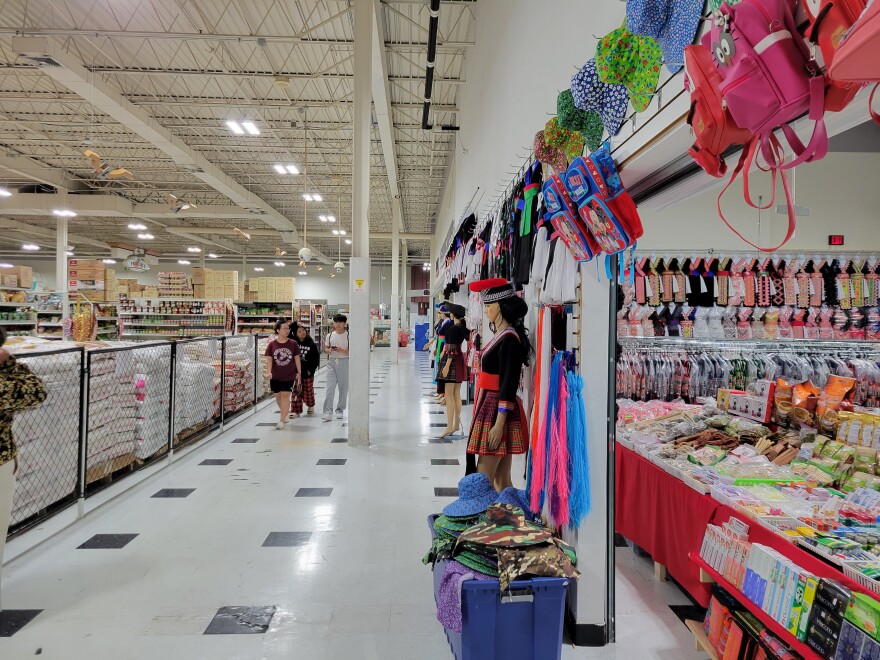The U.S. Small Business Administration assists entrepreneurs of all backgrounds, but this month, it has a heightened focus on AANHPI entrepreneurs. That stands for Asian American, Native Hawaiian and Pacific Islander. In honor of AAPI Heritage Month, the SBA held a roundtable event at Hmong Town Market in Milwaukee’s Longview neighborhood.
Off of 84th Street and Hampton Avenue, Hmong Town is part massive grocery store and part dry goods market and food court. Customers purchase large containers of red pepper flakes, green beans, bottles of peanut oil and boxes of rice noodles.

In the way back, near a small café, administrators from the SBA meet with Asian American small business owners from Wisconsin. The goal? To see how they’re faring after the past few years and let them know about resources.
“The AAPI community kind of had suffered from what we call a kind of double whammy, a double pandemic in a way,” says Jennifer Kim, SBA Associate Administrator of Field Operations. “We don't only face the same kind of economic and, you know, all the struggles that everybody else faced, but there was also an added component of, you know, anti-Asian hate, that has been pervasive and still continues to be an issue.”

Kim says the social climate affects people — and their businesses — in different ways.
“Small businesses often are targets of that anti-Asian hate because it is more visible in the community,” she says. “It’s somewhat easy to just go graffiti a restaurant or what have you. And so that continues to be a problem for the community everywhere. I will say there's a lot of awareness of it now. And that is really helpful.”
At the onset of the pandemic, a Chinese-Japanese restaurant in Milwaukee temporarily shut down after employees faced racist attacks. There was another racist anti-Asian encounter in Shorewood in 2021. Since its start in 2020, the nationwide organization Stop Anti-Asian Hate has logged thousands of such anti-Asian incidents around the country.
That includes a targeted mass shooting in Atlanta in 2021.
But that’s not the big focus for everyone, including Mai Nhia Chang. “I haven't come across any real difficulty with just being Asian,” she says.
Chang runs Xankia, a Vietnamese restaurant in downtown Milwaukee, and was more concerned with economic hurdles.

“I would say some challenges are finding staffing,” she says. “You know, we're such a smaller business compared to the bigger restaurant out there. And we just can't be able to meet up with their pay rate.”
Xankia closed for a year during the pandemic and then recently for two months for remodeling.
Chang says even though it’s been tough to find employees thanks to pandemic grants, they’re doing well — expanding hours and menu options and putting in a bar.
Financial assistance has been crucial, says Geri Aglipay, SBA Great Lakes Regional Administrator. She says the agency granted $787 million dollars in loans to small business owners in Wisconsin in 2022. $83.2 million in SBA-backed loans went to Wisconsin's AAPI small business owners.
Those loans have a longer payback term than traditional loans.
Government contracts are also up for grabs, and not just for businesses in IT or manufacturing. “So somebody who's baking bread, an Asian bakery, has an opportunity to also have contracts with the federal government and their cafeterias and their branches as well,” says Aglipay.
She notes that Asian Americans are actually the most economically divided group in America. “And so being a small business owner is the next best way to build wealth in America next to owning a home. And they can do that at no cost with the SBA and our resource partners as well.”

The entrepreneurs meeting at Hmong Town Market run a range of businesses, from an adult day care center to a pottery studio to a golf center. Representatives of the Hmong Wisconsin Chamber of Commerce also attended.
Coua Xiong is an interior designer in the Fox Valley. She started her own business after 10 years in corporate finance. Resources are her biggest challenge. “And what I mean by resources is like, yes, of course, financial,” says Xiong. “But also kind of like the support of knowing who to go to when I have a business question or like, setting up my taxes, or setting up an LLC. Who can I actually go to that can help me with those business fundamentals and the foundation of my business?"
Her big takeaway from the roundtable? There are people there to help if you look in the right places. Kim from the SBA notes there’s offerings like free counseling and technical assistance at small business development centers statewide and free one-on-one mentorship.
Kim says the one-stop shop is their website.
Editor's Note: Representatives for the SBA originally misspoke about the amount of money in loans awarded to Wisconsin's AAPI small business owners in 2022. That amount has been updated in the piece.


